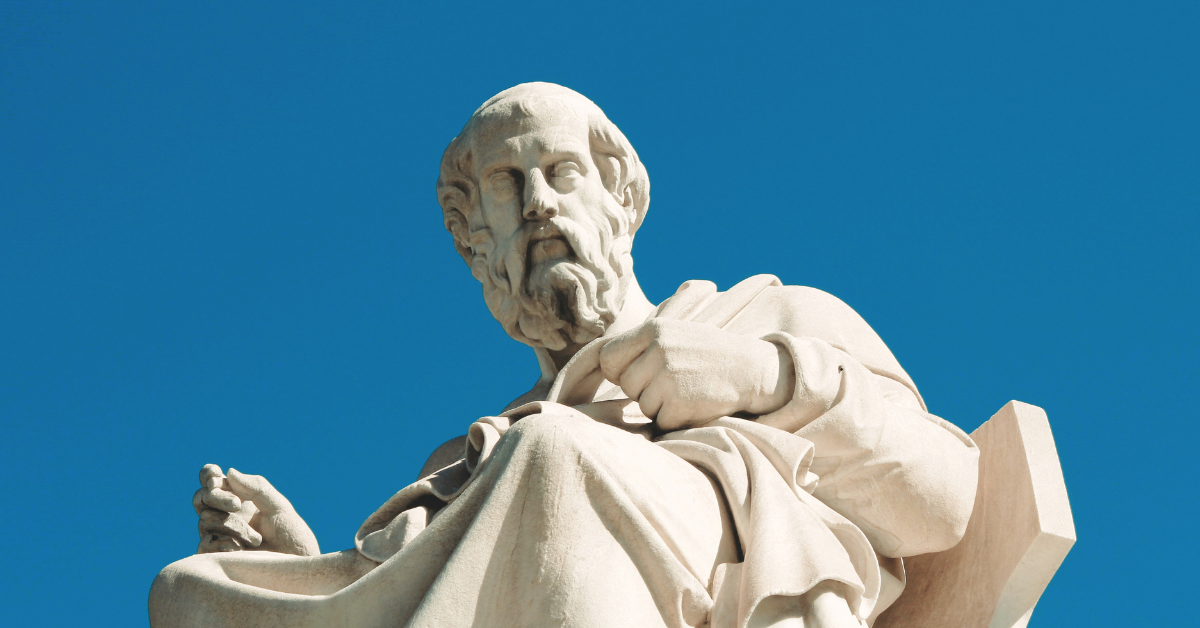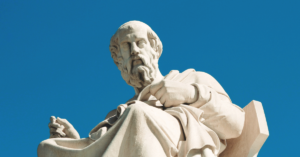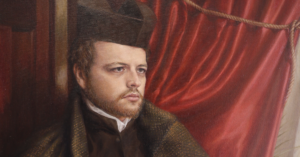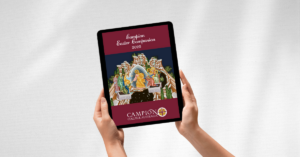

Few figures in history have shaped human thought as deeply as Plato. Born in ancient Athens around 427 BCE, Plato was not only a student of Socrates but also the teacher of Aristotle, forming a lineage of philosophical giants whose ideas still resonate today. Through his dialogues, Plato explored profound questions about reality, knowledge, and the ideal society, developing groundbreaking ideas that laid the foundation for Western philosophy.
Plato’s legacy endures not only because of the brilliance of his ideas but also due to the timeless relevance of his work. His concepts of justice, the pursuit of truth, and the nature of virtue continue to challenge us, offering insights that encourage self-reflection and a deeper understanding of the world. From the famous Allegory of the Cave to his theories of forms, Plato didn’t just address philosophical questions—he fundamentally redefined how we think about them.
Below, we explore some of Plato’s most powerful quotes, each shedding light on key concepts he championed. These quotes capture the essence of his wisdom, inviting us to reflect on ideas that have influenced everything from ethics to politics to personal growth.
Theory of Forms:
“The world is a shadow of the true reality that is the world of the Forms.”
Plato argues that the physical world we observe is merely an imperfect shadow of a higher, unchanging reality — the realm of the Forms. In his view, the Forms represent the purest essence of concepts like beauty, justice, and truth. What we experience in the material world is only a distorted reflection of the true, perfect Forms that exist beyond our senses.
The Ideal State:
“The price good men pay for indifference to public affairs is to be ruled by evil men.”
Plato believed that active participation in public affairs was essential for a just society. This quote highlights that when virtuous individuals avoid involvement in political life, they open the door for less virtuous individuals to gain power. Without good leadership, society can become corrupt, and the consequences are felt by all.
Justice:
“Justice means minding your own business and not meddling with other men’s concerns.”
In Plato’s view, justice is achieved when each person focuses on fulfilling their proper role in society without interfering in others’ responsibilities. A just society is one where individuals and groups work harmoniously, allowing each part of the whole to function in its rightful place, ensuring balance and fairness.
Virtue and the Good Life:
“The first and best victory is to conquer self.”
For Plato, virtue is primarily about self-mastery. This quote underscores the idea that true virtue is the ability to control one’s impulses, desires, and emotions. By conquering ourselves, we can align our actions with reason and cultivate the qualities of wisdom, courage, and moderation that lead to a flourishing life.
Knowledge and Epistemology:
“Knowledge which is acquired under compulsion obtains no hold on the mind.”
Plato emphasises that true knowledge is gained through voluntary engagement and personal reflection. When learning is forced, it lacks the depth and lasting impact needed for wisdom. True understanding comes when the mind is open and willing to seek out the truth freely, not out of obligation.
The Soul:
“The soul takes nothing with her to the next world but her education and virtue.”
Plato believed that the soul is immortal and carries its virtues and wisdom with it into the afterlife. The true worth of a soul is shaped by the education and virtue it cultivates during its earthly journey. The soul’s destiny is determined by how it engages with knowledge and lives virtuously.
Love and Beauty (Plato’s Theory of Eros)
“Love is the pursuit of the whole.”
In Plato’s Theory of Eros, love is seen as a pursuit of wholeness or unity. True love transcends physical attraction and seeks the deeper, eternal beauty found in the soul and in the Forms. For Plato, love is a longing for the perfect, unchanging beauty that lies beyond the material world.
Philosopher-King:
“The one who is in the best position to rule is the one who understands the good.”
Plato argued that the philosopher-king, one who understands the true nature of the good, is best suited to lead society. Only someone who comprehends the higher truths of morality and justice can rule wisely, ensuring the wellbeing of the entire state. A ruler without knowledge of the good is unfit to govern.
Socratic Method and Dialogue:
“I am the wisest man alive, for I know one thing, and that is that I know nothing.”
This quote exemplifies the Socratic method of inquiry. For Plato, true wisdom begins with an awareness of one’s own ignorance. By questioning assumptions and engaging in dialogue, we can uncover deeper truths. The process of self-examination is essential to knowledge.
Ethics and Morality:
“No one is more hated than he who speaks the truth.”
Plato believed that ethical behaviour often requires speaking uncomfortable truths. This quote highlights that those who confront society’s illusions or challenge popular beliefs may be met with resistance or even hostility. Despite the backlash, the pursuit of moral integrity and truth remains central to a virtuous life.
Utopianism:
“The state is the soul writ large.”
Plato believed that society is an extension of the individual soul. The state, like the soul, requires harmony between its parts. A just state is one where each class (rulers, warriors, and workers) functions in alignment with their natural abilities, creating a balance that mirrors the structure of a well-ordered soul.
The Tripartite Theory of the Soul:
“A fool is one who is governed by his passions and does not act with reason.”
Plato divided the soul into three parts: reason, spirit, and appetite. A fool, according to Plato, is someone whose passions (appetite) or emotions (spirit) dominate their decisions, leading them away from rational thought and self-control. True virtue arises when reason governs the soul, bringing balance and clarity.
Metaphysics:
“Reality is created by the mind, we can change our reality by changing our mind.”
Plato’s metaphysical outlook suggests that the mind plays a key role in shaping reality. By engaging with the Forms and aligning the mind with eternal truths, one can transform their perception of the material world. This connection between the mind and reality emphasises the importance of philosophical thinking in shaping our lives.
Political Ideals vs. Reality:
“The tyranny of the majority is the most dangerous form of government.”
Plato’s criticism of democracy centres on the danger of the majority ruling without wisdom. He saw the tyranny of the majority as a flaw in democratic systems, where decisions are made based on emotional impulses rather than rational deliberation. In such systems, reason is often drowned out, leading to chaos and corruption.
Immortality of the Soul:
“The soul of the philosopher is of all souls the most immortal.”
Plato believed that the soul is eternal, and those who dedicate their lives to wisdom and knowledge, particularly philosophers, purify their souls and make them more enduring. The philosopher’s soul, in particular, aligns with the divine and thus becomes the most immortal in Plato’s view.
The Allegory of the Cave:
“The unexamined life is not worth living.”
This quote emphasises the importance of self-reflection and philosophical examination. Plato’s Allegory of the Cave illustrates how most people live in ignorance, only seeing shadows of truth. To live a meaningful life, one must seek out knowledge and question appearances, moving beyond the confines of the cave into the light of true understanding.





